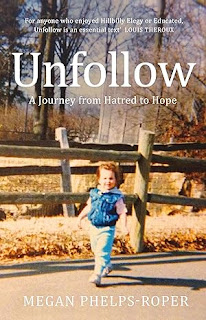Last Christmas I met up with my friend Edwin and one of the things we discussed was reading habits. I set myself the fairly modest aim of reading one book a month... an aim that I've been failing at for most of the year. So far I've only blogged two books (in January and March).
Anyway, my third book of the month for 2023 (in September!) is Unfollow by Megan Phelps-Roper. Its her autobiographical account of growing up in the controversial and reviled Westboro Baptist Church, whose crude and offensive placard protests became a recurrent media story in the late 90s and continue even now.
I remember discussing Westboro's hateful campaigning with church friends back when Megan was active in the protests. A group of us watched the documentary that Louis Theroux made about the church. The general consensus was we couldn't understand how people who claimed to believe the same sort of things we did had gone onto such a horrible tangent and become fixated on condemning "sin".
But reading this book, the feeling I kept getting was that the difference between my experience of growing up in a religious household and Megan's experience was just a difference of degree. The idea of being specially chosen by God and knowing the Truth that the sinful world is wilfully ignoring is very relatable. When I was growing up I was very aware that I was different to most of the people I knew because I went to church and was 'saved'.
I'm not even sure that Westboro's beliefs are that far off the mainstream for many churches like the one I grew up in. What made Westboro famous was the church's actions rather than their beliefs. When Megan outlines the underlying beliefs about sex and sexuality, the world being sinful and under judgment and salvation only being for the chosen few I felt myself thinking 'Yep, I've heard that'.
Although it's a hard subject to read about, and personally slightly triggering, Megan's writing style is absorbing and really hooked me in. It's novelistic, with excellent use of foreshadowing. The chapter about Megan and her sister, Grace, planning their escape from the church that was also their family was tense and had me worried for their safety. The whole book reminded me of the way Margaret Atwood constructs horror stories grounded in mundanity.
It was interesting to learn the origins of Westboro. Arch-patriarch Feed Phelps was famous for being a white lawyer who would take on civil rights cases in Kansas long before the church started protesting. He made enemies and refused to back down despite opposition because he knew that he was right to combat racism - and it doesn't take much to see how that strong-willed belief in the righteousness of his cause went on to fuel Westboro's attacks on gay people and anyone else the church labelled as 'sinners'.
The prompt for Megan to consider leaving wasn't really anything external. It was church politics and a disconnect between what the church taught and how the church leaders acted that poked the first chink in the logical armour she had built for herself. But the cognitive dissonance she felt between how things ought to be and how things actually were nagged at her.
Megan details the unravelling of her faith in a moving chapter. What's noticeable is how fast she went from questioning one thing to realising that everything could be questioned... and the 'correct' answers were no longer satisfying. From that point on she started planning how to leave - an incredibly hard and brave choice to make which has left her implacably estranged from her parents, siblings and other relatives still in the church.
I'd like to say the story has a happy ending. Megan escaped and found love and support from many people outside the church. She has gone on to become an advocate for LGBTQ+ rights and a critic of religious extremism. But the book ends with a plea to her family members who have shunned her since she left. She desperately wants the people she loves to leave behind the prison they have constructed for themselves and the hope in her closing words lends a raw poignancy to her story.

No comments:
Post a Comment